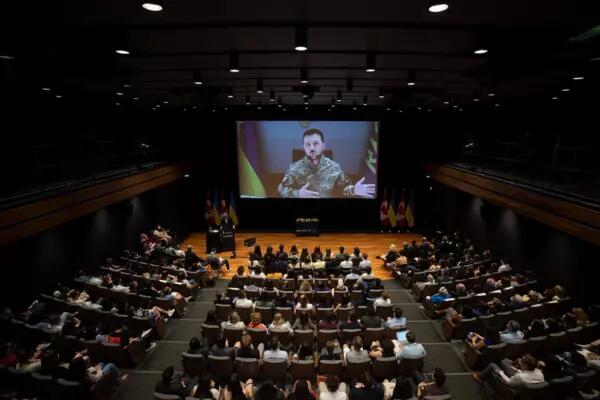
From November 9 to 16, 2020, Ronald J. Deibert, a professor with the Munk School and the Department of Political Science at the University of Toronto, and director of the Citizen Lab, will deliver the 2020 Massey Lectures on CBC Radio’s IDEAS. His new book, Reset: Reclaiming the Internet for Civil Society, explores how the expansion of society towards a system of surveillance capitalism has created and exacerbated social and political afflictions. The book is available for purchase from House of Anansi Press and Deibert will hold an online launch for the book on November 10. We asked Deibert a few questions about Reset and delivering the Massey Lectures.
You are the 2020 Massey Lecturer, joining the ranks of an esteemed group of thinkers that includes Martin Luther King Jr., Jane Jacobs, Noam Chomsky, Margaret Atwood and many other luminaries. What does this honour mean to you?
It is both a great honour and truly surreal. I grew up listening to CBC IDEAS and the Massey lectures, and the books that accompany them were foundational to me. I devoured the books of C. B. Macpherson, George Grant, John Kenneth Galbraith, Ursula Franklin, and the other luminaries you mention. It’s like a dream to be on this distinguished list.
You are a political scientist by training who started Citizen Lab in 2001. In the book, you describe the Lab’s mission as using interdisciplinary research to serve as “counter-intelligence for global civil society.” Describe the Lab's unique approach.
As a young graduate student, I had the opportunity to do some contract work for a small unit in the Department of Foreign Affairs, Canada (as it was called then), whose focus was on verification of arms control. Through that experience, I came to recognize the value of interdisciplinary approaches to arms control verification – the combination of satellite imagery, underwater sensors, seismic monitors, and other tools all with the goal to monitor the globe for evidence of states cheating on their commitments to agreements on nuclear and chemical weapons. It dawned on me that a similar approach could be developed to uncover the abuse of power by governments and the private sector in the global telecommunications ecosystem. It took many years to develop, attract, and retain the type of skilled researchers to make this mission viable. Although the Citizen Lab’s technical work tends to get the most attention, we also make use of law and policy methods to undertake our research.
What do you count among Citizen Lab’s greatest achievements to date?
We are fortunate to have had so many great achievements over the years. I would count the work we have done on targeted espionage as our greatest – beginning with the landmark Tracking Ghostnet report in 2009 to, more recently, our reports identifying Saudi espionage against Omar Abdul Aziz and other Saudi dissidents some of whom were close confidants of the murdered journalist, Jamal Khashoggi.
At the start of the book, you describe social media as “vehicles for the relentless collection and monetization of the personal data of their users.” How has the rise of social media and “surveillance capitalism” changed our digital landscape?
Well, it surrounds us all now. We can’t escape it. It’s in our pockets, even in our minds. That’s a consequence of that relentless collection and monetization of personal data. There can be no logical endpoint. Sensors are built upon sensors. One door leads to another door to be opened, only to lead to another door, and so on. The pandemic is going to give rise to an even greater level of intrusiveness with the normalization of biomedical surveillance. We are all cyborgs now.
You argue that technologies designed for one purpose often result in consequences that are far different than were originally intended. There are countless examples of technologies and platforms created to foster collaboration and communication that have been turned against civil society and used for nefarious purposes. How can civil society fight back against the constant threat of surveillance?
There is no one simple solution. Unaccountable and unlawful surveillance is spreading wildly, thanks in part to an ecosystem that is insecure, poorly regulated, invasive by design, and prone to abuse, and thanks in part to a burgeoning private sector surveillance industry. Government agencies are now equipped with sophisticated tools, products, and services that are contributing to a “great leap forward” in technologies of remote control. We now have 21st-century superpower policing alongside 20th- and 19th-century safeguards. The only solution is a comprehensive reform of safeguards to restrain governments and companies to prevent the abuse of power.

We often think of digital technology as providing ‘sustainable solutions to global problems', but you argue that there are significant environmental harms associated with our addiction to our devices. Can you elaborate?
Early reactions among many who have read Reset is that their favourite chapter is “Burning Data,” which is about the often-overlooked ecological impacts of social media and our communications ecosystem. While we tend to imagine social media and digital tech as clean, virtual, and ethereal (an image promoted by the platforms themselves) they are far from it. There is a large ecological footprint connected to our digital consumption practices, from mining and manufacturing to energy consumption and waste. If we continue on this path of unbridled consumption and planned obsolescence, we are doomed.
One of the major aims of this book is to get us thinking about how to mitigate the harms of social media and to build a communications ecosystem that supports civil society and works to improve the human condition. Why do you think this is the once-in-a-lifetime moment to reset? How can we begin to step back, regroup, and return to first principles?
Well, time is running out. We face several existential risks that are looming on the horizon, the most important of which is climate change. Communication technologies are essential environmental monitoring and environmental rescue, and yet the current architecture of social media and digital technologies (organized around surveillance capitalism) is entirely dysfunctional to those aims. We need to step back, take stock, develop a new way forward, and make it happen – before it’s too late.
If we continue on this path of unbridled consumption and planned obsolescence, we are doomed.- Ron Deibert
After our reset, you argue, we should double down on restraint as a way forward. Can you explain why this is essential? What role does the government have to play? What role should universities play in this effort?
I make a plea in my lectures for a single, overarching principle to guide us moving forward: restraint. The common-sense meaning of “restraint” is keeping someone or something under control, including our emotions, our habits, and our behaviours.
While seemingly simple and familiar to most, restraint is a concept with a rich historical legacy connected to a long line of political thinking and practice that reaches all the way back to ancient Greece and is typically associated with that family of theorizing known as “liberal-republicanism.”
Drawing inspiration from some of the ways republican-inspired thinkers have conceptualized restraint mechanisms in the past, I put forward some suggestions for how we might think about restraint measures in our own times — as means to rein in the excesses of social media and guard against abuses of power, all the while preserving the great potential of our communications ecosystem.
We need to restrain what both governments and corporations do with all the extraordinarily powerful tools of surveillance that are now in their hands. Restraints will be essential to ensure the security of the broader information and communications space in which we live, particularly restraints on bad actors exploiting us for despotic, corrupt, or criminal ends, or governments exploiting it for their narrow national security aims. We’ll need personal restraints too: restraints on our endless appetite for data, restraints on our emotions, and anger as we engage online in the absence of the physical cues that normally help contain them.
Your book, Reset: Reclaiming the Internet for Civil Society, will air as a series of lectures on CBC Radio’s IDEAS. How did the fact that you were going to deliver these lectures orally shape the way you wrote the book?
Most of my day-to-day writing at the Citizen Lab is characterized by highly meticulous, evidence-based research outputs. So much is at stake in our reporting and so we have to be extremely careful around claims, methods, and evidence. That type of writing is very clinical, for good reason.
The Massey Lectures gave me an opportunity to write in a different way for a more general audience. That meant I could be more playful and tell stories. I love writing this way. It is fun, it’s a relief in a way. It’s like being “unplugged.”
I have many friends who are not academics, but who are nonetheless highly intelligent, thoughtful people. I saw those friends as my “target audience.”
Munk School founding director Janice Stein delivered the 2001 Massey Lectures on The Cult of Efficiency and Munk School senior distinguished fellow Margaret MacMillan delivered the 2015 lectures on History’s People: Personalities and the Past. Did either of them have any advice for you?
Janice has been a friend and colleague since I was hired at the U of T in 1996. She gave me some general advice on how to make the book accessible, and to make sure there was a core argument that threaded its way through the book. I hope I didn’t disappoint her. I know she was probably thrilled to give me this type of advice because more often than not she’s given me advice on how to stay out of trouble.



